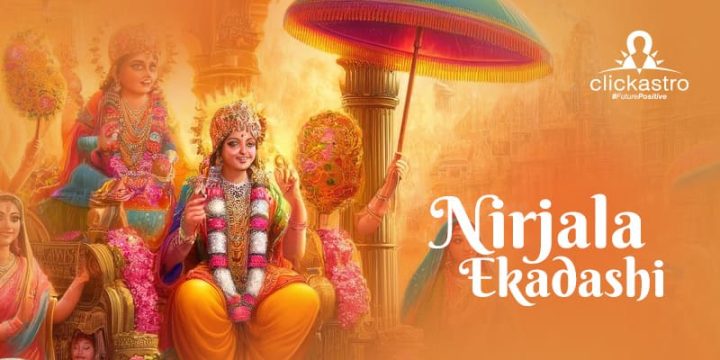Contents[hide]
When is Nirjala Ekadashi 2024?
In 2024, Nirjala Ekadashi will be observed on Tuesday, June 18.
Important timings for Nirjala Ekadashi are as below:
| Sunrise Timings | June 18, 2024 5:45 AM |
| Sunset Timings | June 18, 2024 7:10 PM |
| Ekadashi Tithi Starts | June 17, 2024 4:44 AM |
| Ekadashi Tithi Concludes | June 18, 2024 6:25 AM |
| Dwadashi End Timing | June 19, 2024 7:28 AM |
| Hari Vasara End Timing | June 18, 2024 12:41 PM |
| Parana Timing | June 19, 5:45 AM – June 19, 7:28 AM |
Nirjala Ekadashi festival dates from 2023 to 2026
| Year | Day | Date |
| 2023 | Wednesday | May 31st |
| 2024 | Tuesday | June18th |
| 2025 | Friday | June 6th |
| 2026 | Thursday | June25th |
Vrat Vidhi of Nirjala Ekadashi Vrat
Nirjala Ekadashi Vrat, as the name implies, must be observed without consuming even a drop of water. As a result, this fast is considered extremely holy and strict. Of note is that this fast is observed during the summer, and hence complete abstinence from food would be difficult. Moreover, the Nirjala Ekadashi vrat is observed for 24 hours, beginning from the sunrise of Ekadashi Tithi to the sunrise of Dwadashi Tithi. Hence, fasting on Nirjala Ekadashi would not be ideal for those suffering from any form of illness or who are taking any medicines for serious illnesses. However, such devotees are permitted partial fasting as supreme devotion to Lord Vishnu is more important than rigorous fasting restrictions. Nirjala Ekadashi fast begins with a ceremony known as “Sandhyavandanam”, which is observed on Dashami (10th Tithi). The devotee consumes a meal without rice before nightfall after concluding the Sandhyavandanam. The fast then lasts for the entire Nirjala Ekadashi day and is concluded on Dwadashi (12th Tithi) after revering Lord Vishnu and offering food to the Brahmins. On every Ekadashi day, the main deity worshipped on Nirjala Ekadashi is Lord Vishnu when devotees place their full devotion to the Lord.
On every Ekadashi day, the main deity worshipped on Nirjala Ekadashi is Lord Vishnu when devotees place their full devotion to the Lord.
The devotee observing the Nirjala Ekadashi fast must wake before dawn and have their bath. They must then take a Sankalp or a vow to observe the fast with great devotion.
They may offer prayers at a Lord Vishnu/Krishna temple nearby. If there are no temples around, they may worship Lord Vishnu’s idol at their home. The idols must be placed on the puja pedestal and offer sandalwood, flowers, fruits, ghee, incense sticks, and Tulsi leaves. The deity is the offered delicious bhog.
During the day, the devotees must abstain from sleeping during Nirjala Ekadashi fast. So instead, they spend the day worshipping and meditating on Lord Vishnu and chanting mantras, and listening to the Nirjala Ekadashi vrat katha.
They adorn the idols with beautiful clothes and ornaments in the evening and offer prayers and perform Aarti. The devotees must stay awake the entire night during Nirjala Ekadashi Vrat.
Then, a Jagrata is observed where the devotees sing bhajans and kirtans and chant the Vishnu Sahasranamam and hymns praising the glory of Lord Vishnu. The fast is concluded the next day, i.e. Dwadashi Tithi. The devotees wake up early, before sunrise and after having their bath and offering prayers to the deity; the fast is concluded by donating food, clothes, water, and other necessities to the poor and the needy. Donation is considered to be a significant ritual during Ekadashi. The devotees also offer clothes, food grains, and other essentials to the Brahmins. The fast is then broken by drinking water.
Nirjala Ekadashi fast begins with a ceremony known as “Sandhyavandanam”, which is observed on Dashami (10th Tithi). The devotee consumes a meal without rice before nightfall after concluding the Sandhyavandanam. The fast then lasts for the entire Nirjala Ekadashi day and is concluded on Dwadashi (12th Tithi) after revering Lord Vishnu and offering food to the Brahmins. On every Ekadashi day, the main deity worshipped on Nirjala Ekadashi is Lord Vishnu when devotees place their full devotion to the Lord.
On every Ekadashi day, the main deity worshipped on Nirjala Ekadashi is Lord Vishnu when devotees place their full devotion to the Lord.
The devotee observing the Nirjala Ekadashi fast must wake before dawn and have their bath. They must then take a Sankalp or a vow to observe the fast with great devotion.
They may offer prayers at a Lord Vishnu/Krishna temple nearby. If there are no temples around, they may worship Lord Vishnu’s idol at their home. The idols must be placed on the puja pedestal and offer sandalwood, flowers, fruits, ghee, incense sticks, and Tulsi leaves. The deity is the offered delicious bhog.
During the day, the devotees must abstain from sleeping during Nirjala Ekadashi fast. So instead, they spend the day worshipping and meditating on Lord Vishnu and chanting mantras, and listening to the Nirjala Ekadashi vrat katha.
They adorn the idols with beautiful clothes and ornaments in the evening and offer prayers and perform Aarti. The devotees must stay awake the entire night during Nirjala Ekadashi Vrat.
Then, a Jagrata is observed where the devotees sing bhajans and kirtans and chant the Vishnu Sahasranamam and hymns praising the glory of Lord Vishnu. The fast is concluded the next day, i.e. Dwadashi Tithi. The devotees wake up early, before sunrise and after having their bath and offering prayers to the deity; the fast is concluded by donating food, clothes, water, and other necessities to the poor and the needy. Donation is considered to be a significant ritual during Ekadashi. The devotees also offer clothes, food grains, and other essentials to the Brahmins. The fast is then broken by drinking water.
Download Free Wealth Horoscope
What are the fasting rules for Nirjala Ekadashi?
The ancient Hindu manuscripts have described the rules of fasting on Nirjala Ekadashi to gain the ultimate blessings of Lord Vishnu, and devotees must strictly observe the rules prescribed. The rule of no water consumption can be eased for those devotees who have any health conditions. Such devotees may drink water and keep a partial fast. Here are a few rules for Nirjala Ekadashi which can be observed by all.- The devotees must abstain from consuming beans and grains on Ekadashi
- They should refrain from hurting or killing any animals or living beings.
- One should not sleep during the day of Ekadashi and Dwadashi
- Devotees must refrain from fights or conflicts and must not be involved in nefarious activities. They should also refrain from people who are involved in immoral activities.
- They should abstain from gambling, alcohol, and sex during the fasting days, i.e. from Dashami to Dwadashi.
- The devotees must break the fast on Dwadashi in their homes and have only one meal without honey and black lentils.
- The fast should be broken by drinking water which signifies the completion of the fast.
Nirjala Ekadashi Vrat Katha
The Brahma-Vaivarta Purana has described the Nirjala Ekadashi Vrat Katha. The vrat Katha is described as a conversation between Bhima, one of the Pandavas, and Sage Veda Vyasa, who was the grandfather of the Pandavas. During the conversation, Bhima asked Sage Veda Vyasa if his soul would be able to ascend to the spiritual world even if he could not fulfil all the norms of the Ekadashi fast. Bhima loved to eat and was believed to be able to consume enormous amounts of food. Bhima tells VedaVyasa that his mother, Kunti, wife Draupadi, and his brothers, Yudhishthira, Arjuna, Nakul, and Sahadev, all rigorously observed the Ekadashi fasts, and they advised him to do so, too on numerous occasions. However, the idea of fasting for 24 hours seemed inconceivable to Bhima who claimed that the sheer concept of not eating made him shudder because he couldn’t control his hunger. Bhima asserted that he could easily perform any number of charities and revere Lord Vishnu with opulent offerings. Still, he could not perform the fasting. Bhima begged his grandfather to provide an alternative method of gaining the Ekadashi merits in the simplest way possible without fasting. When Veda Vyasa heard his grandson’s plea, he enlightened Bhima about the numerous virtues that can be earned by rigorously practising Ekadashi fasts and gaining the abundance of Lord Vishnu’s blessings. However, understanding Bhima’s hardship, Veda Vyasa suggested that observing only the Nirjala Ekadashi fast and keeping a Nirjala vrat without eating or drinking anything would allow Bhima to gain all the merits equal to those earned by fasting on all the other Ekadashis. Veda Vyasa further stated that someone who observed the Nirjala Ekadashi by following all of the prescribed rules and being deeply involved in the devotion of Lord Vishnu and singing praises of the Lord on Ekadashi day and throughout the night of Nirjala Ekadashi would certainly be liberated and secure a place at Lord Vishnu’s feet in his perpetual abode, Vaikunta. Following Veda Vyasa’s explanation of the merits of Nirjala Ekadashi fasting, Bhima promised to maintain at least the Nirjala vrat on the auspicious day of Nirjala Ekadashi.Significance of Nirjala Ekadashi Vrat
The Nirjala Ekadashi is one of the most rewarding Ekadashis in the Hindu culture. This Ekadashi is extremely auspicious and bestows wealth, happiness, longevity, and deliverance from sin and Moksha. The renowned Sage Veda Vyasa revealed the significance of Nirjala Ekadashi. Nirjala Ekadashi vrat is thought to bestow the devotee with the collective merits of all 23 Ekadashis. As a result, devotees who are unable to observe all 23 Ekadashis must observe the Nirjala Ekadashi fast to reap the virtues. It is believed that Ekadashi fasting is more sacred than visiting Hindu pilgrimage sites. Nirjala Ekadashi is observed before the monsoons and therefore aids in body purification. It is also widely accepted that the devotee of the Nirjala Ekadashi vrat gains direct entry to Vaikunta – the eternal abode of Lord Vishnu after their death.Gain the ultimate blessings of Lord Vishnu this Ekadashi – Nirjala Ekadashi on June 18th.








good conetent about ekadashi. Thank you for sharing